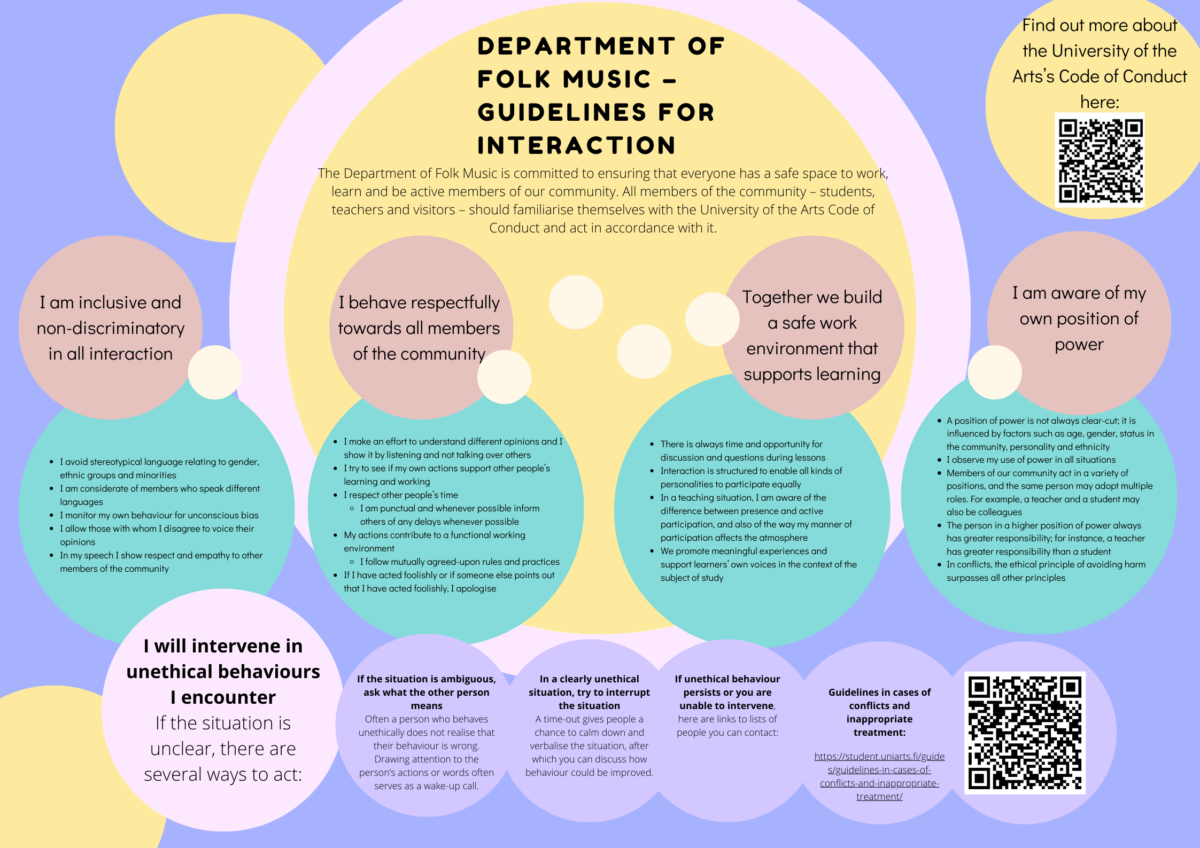Folk Music Department addresses alumni’s critical observations on the department’s learning environment and culture

A few years ago, the Me Too movement brought to light widespread misconduct across various cultural sectors, including the field of folk music. In the Sibelius Academy Folk Music department, we also recognise this pervasive societal challenge, which no one is immune to. Unfortunately, as a department, we have not been able to fully anticipate, identify, and prevent all instances of inappropriate behavior or cultural traits negatively affecting student well-being.
Our alum Vilma Jää has brought up this crucial issue not only in her art but also in a recent social media post, to which we, as the Folk Music department at the Sibelius Academy, want to respond. It is shocking and alarming that a student has had distressing or even traumatising experiences during their studies and has not felt heard during the university’s investigative process. No student should experience any form of inappropriate behavior in their learning environment, and we take cases brought to our attention extremely seriously. Every teacher must understand the responsibility that comes with their position of authority.
The Folk Music department is committed to continually improving in maintaining a safer learning environment for everyone. As part of Uniarts Helsinki, the department follows the university’s practices for addressing incidents of inappropriate behavior. All reported cases are handled according to the university’s process, and there are consequences for such behavior. Solutions are not made within the Folk Music department as they are guided by the process defined by Uniarts Helsinki. Strong privacy protection prevents the disclosure of the stages or outcomes of the processes even to the different parties involved in the case.
The Folk Music Department has actively developed its internal culture in collaboration with students and by listening to alumni. In arts education, the relationship between teacher and student is typically close and interactive, requiring the teacher to be acutely aware of their power position. Folk music education involves the transmission of skills and repertoire largely through aural means, emphasising collective playing.
Folk music’s distinctive feature is its inclusivity, where playing, singing, and dancing are open to everyone, amateurs and professionals alike. The hierarchy typical in performance-based music, separating performers and audiences, is often lower. Folk music, at its best, serves as a community-building force.
We strive to create a learning environment where students grow as members of the academic community, becoming folk musicians and independent artists. Ensemble playing and singing are integral to the curriculum. In addition to degree concerts, students gain practical skills by performing outside university premises, sometimes alongside teachers. Teachers must navigate their position and responsibility with precision, understanding that while they may be musical colleagues, the power dynamic persists.
The Folk Music department is committed to reducing the threshold for reporting inappropriate behavior and preventing incidents proactively. We have established shared principles for a safe space, guiding the department’s activities. This publicly accessible code of conduct is reviewed annually in both teacher and student gatherings, fostering regular discussions on aspects that may be challenging to remember or recognise in day-to-day activities.
We closely monitor student well-being, with a student representative regularly attending weekly teacher meetings to convey students’ thoughts, well-being, and sentiments. Discussions on power dynamics and teacher responsibility are ongoing. We empower students by providing tools to enhance their well-being, including regular personal and group tutoring, a study skills and well-being course added to the curriculum in 2018, and mentorship.
Processes at Uniarts Helsinki for handling problematic situations are continually developed, with increased resources allocated to student well-being and teacher training. The current ’Don’t deal with it alone’ campaign, a joint initiative of the university and its student union, addresses themes of inappropriate treatment, psychological safety and responsible behavior.
Our role as educators extends beyond imparting skills to supporting holistic development and growth. However, it is evident that current efforts are insufficient. Equality, the sense of being heard in problematic situations, and the smoothness and transparency of processes still require work.
Unfortunately, the Folk Music department cannot change past events or deficiencies in past years’ organisational culture, but we actively work towards a better future. Addressing issues is never easy, especially for students. We are proud of the courage shown by our students and alumni.
Sirpa Lahti, Head of the Folk Music department
Kristiina Ilmonen, Professor of Folk Music
Pärrä
Pärrä on Kansanmusiikin koulutusohjelman blogi.
Tutustu Kansanmusiikin koulutusohjelmaan:
Linkit avautuvat uuteen välilehteen.
- nettisivu: www.uniarts.fi/kansanmusiikki
- julkaisualusta: www.etno.net
- Satasarvi – Kansanmusiikin tutkimuksen aikakauskirja: etno.net/julkaisut/satasarvi
Uusimmat julkaisut
-
Syvälle - Kansanmusiikin improvisaatiolaboratorio: jaetun improsäveltämisen praktiikan äärellä
-
Kansanmusiikintutkimuksen aikakauskirja Satasarvi 2 on julkaistu
Seuraa blogia